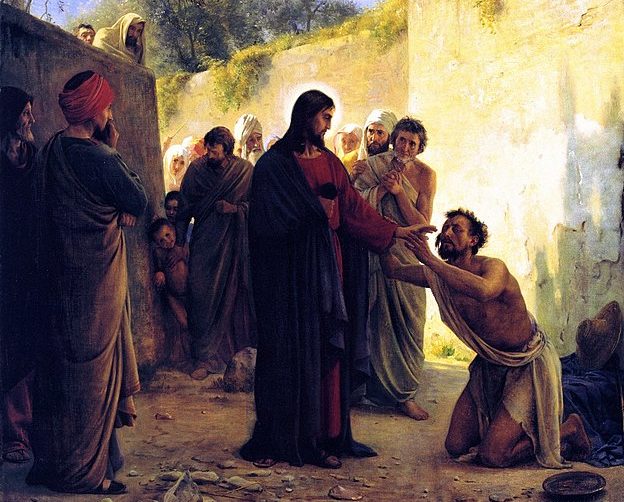Last edited on 3/Mar/2021
The Bible’s Answer
Introduction
Some Christians today believe and teach that it is wrong, or even sinful, to do any type of work on the Sabbath, even if it is just menial tasks at home. But before explaining whether or not such a position is biblical, what exactly is the Sabbath?
Overview of the Sabbath
The Sabbath is Saturday, the seventh day of the week marking the day when God rested from his work of creating the heavens and the Earth. This can be found very early on in the Old Testament, in Genesis 2:3, which says:
So God blessed the seventh day and made it holy, because on it God rested from all his work that he had done in creation. (Genesis 2:3, ESVUK)
Later on, when God delivered the Ten Commandments to the children of Israel through his servant, Moses, his third commandment was that the people remember the Sabbath to keep it holy, and to not do any work on it:
Remember the Sabbath day, to keep it holy. 9 Six days you shall labour, and do all your work, 10 but the seventh day is a Sabbath to the LORD your God. On it you shall not do any work, you, or your son, or your daughter, your male servant, or your female servant, or your livestock, or the sojourner who is within your gates. 11 For in six days the LORD made heaven and earth, the sea, and all that is in them, and rested on the seventh day. Therefore the LORD blessed the Sabbath day and made it holy. (Exodus 20:8–11)
So, clearly, if we just take into account these passages alone, it would seem clear that Christians are required to keep the Sabbath by not doing any work on it. But the problem is that these are not the only passages of Scripture that talk about the Sabbath, or, to put it more broadly, that talk about the Law of Moses itself.
The Old and New Covenant
In order to properly understand this issue, we must realise that the Bible talks about several different covenants. The covenant that God made with the Israelites at Mt Sinai, in which he gave them the Ten Commandments, is called the Mosaic/Sinaitic covenant, or more generally, the old covenant. It was to be maintained by obeying the Law of Moses and was for the Israelites alone. God has now, however, made that covenant obsolete. This happened 2,000 years ago, when Jesus Christ established the new covenant in his blood, shed on the cross, for the forgiveness of all our sins:
But as it is, Christ has obtained a ministry that is as much more excellent than the old as the covenant he mediates is better, since it is enacted on better promises. 7 For if that first covenant had been faultless, there would have been no occasion to look for a second. 8 For he finds fault with them when he says: “Behold, the days are coming, declares the Lord, when I will establish a new covenant with the house of Israel and with the house of Judah, … 13 In speaking of a new covenant, he makes the first one obsolete. And what is becoming obsolete and growing old is ready to vanish away. (Hebrews 8:6–8, 13)
This new covenant is not only for the Israelites, or those residing in the land of Israel, but for everyone in the whole world. Under this covenant, anyone who believes that Jesus died for all of their sins on the cross, was buried, and rose again bodily from the dead on the third day, freely receives forgiveness from God and eternal life, not because of anything we have done, but only by his grace (Ephesians 2:8–9).
By the inward transformation of the Holy Spirit, we are then moved to follow Christ’s commandments, not to maintain our salvation, but rather to show him gratitude for loving us first. The main precepts of the new covenant are to simply love God and our neighbour and to believe in Jesus’ name (Matthew 22:36–40; 1 John 3:21–23). The old covenant is no longer in effect.
The Sabbath Is Now Obsolete
This means that the Law of Moses, which the Israelites had to obey to stay in their covenant relationship with God—which could be renewed anytime through repentance if they ever broke his commandments—is now obsolete. We no longer have to obey any part of the Law except for the moral commandments in it that have been repeated in the New Testament. Since the commandments regarding the Sabbath day are in the old covenant only and not the new, we no longer have to follow them. To pressure someone into not doing any type of work on the Sabbath is making the mistake of confusing the precepts of the old covenant with the new. Paul confirms all of the above when he said:
Therefore let no one pass judgement on you in questions of food and drink, or with regard to a festival or a new moon or a Sabbath. 17 These are a shadow of the things to come, but the substance belongs to Christ. (Colossians 2:16–17)
The commandments about the Sabbath day were only a shadow of the glory that was to come and actually pointed to Jesus Christ himself, who is the substance of all the Scriptures. Now that we have Christ, all of these laws in the old covenant regarding the Sabbath are useless to follow.
Whoever is in Christ, that is to say, whoever believes in Christ, has entered into a new Sabbath rest which the author of Hebrews refers to (Hebrews 4:2–3, 8–11), which is the confidence of eternal salvation and peace with God, through Jesus Christ our Lord. Jesus is our ultimate Sabbath rest. Every day we remember and celebrate what he has done for us and every day we worship him in thanksgiving. Therefore, for Christians, every day is a Sabbath day of rest which Jesus has won for us by his death on the cross and resurrection from the dead.
Conclusion
Because we are no longer under the old covenant, but the new, and there is no commandment in the New Testament to observe the Sabbath, and because the Sabbath was just a shadow which pointed to Jesus, the real substance, Christians, therefore, do not have to keep the Sabbath of the old covenant. The real Sabbath, which the New Testament proclaims and which Jesus fulfilled, is the salvation that we have in Jesus Christ our Lord.






